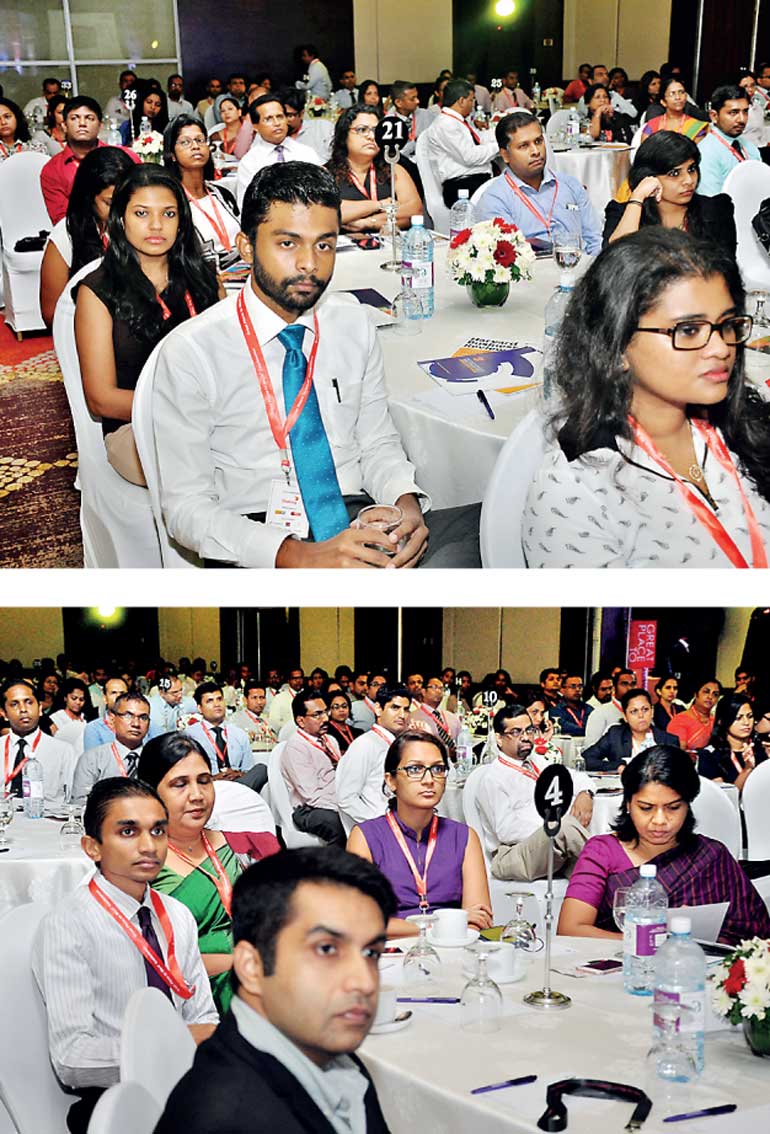Saturday Feb 21, 2026
Saturday Feb 21, 2026
Tuesday, 26 July 2016 00:15 - - {{hitsCtrl.values.hits}}
By Hiruni Dabarera
In challenging times for business organisations with vast technological advancements, machines replacing human labour and diverse industry disruptions, Great Place to Work held its annual conference on the timely topic ‘Innovate: Disrupt: Engage’ last Friday. The  conference hoped to assist top companies in Sri Lanka to become great places to work by being innovative to combat market disruptions through the proper engagement of its work force.
conference hoped to assist top companies in Sri Lanka to become great places to work by being innovative to combat market disruptions through the proper engagement of its work force.
“The success of an organisation depends on its most valuable asset-its people, and people need to be engaged and motivated to give their best. In order to drive engagement within people, we need new ideas and methods that challenge the status quo and interrupt the way we do things,” pointed out Great Place to Work Sri Lanka CEO Kshanika Ratnayaka.
The conference was addressed by corporate professionals in both local and global arenas who shared their experiences about great places to work, how well to adapt in times of change and to effectively engage the employees to keep profits flowing.
Great Place to Work is a professional services company and is in the business of assessments and conducting research and conferences with the mission of making Sri Lanka a great place to work. Its headquarters is based in San Francisco and ranges across 52 countries. The institute assesses over three million employees annually in 7000 organisations impacting around 15 million lives across the globe. Each year the institute publishes a national list of great work places to work in every country an institute is based in. One of its aims had been to share the learnings, trends and best practices identified in their study and the conference organised annually hopes to achieve this.
“Creating a great place to work is a journey, not a destination and there is no specific route to get there. I believe that when you leave this conference you will be inspired to partake in the journey or continue in the path that you are committed to follow, to make your workplaces a great place to work,” Ratnayake further expressed.
The opening address at the conference was delivered by Google India Industry Director Nitin Bawankule who shared why Google was named countless times as the best place to work in the world.
“At Google, we do not have a Human Resource Department; instead we call it the People Operations (PO) Department. I would like to recall my own experience with the PO department few years back that quite surprised me about how they cater to their employees’ needs emotionally. When my father was seriously sick and was hospitalised for 45 days, I brought the invoices of the hospital fees as per my insurance claim’s limit. But, I was surprised when the whole of the hospital expenses was covered by Google. What matters here was not the financial assistance they provided me with, but their proactive approach of identifying that this employee is going through something that we as a company can help him through,” he stated.
Founded by Larry Page and Sergey Brin in 1998, Google was primarily a search engine. At the beginning their focus was on how they will do only one thing, and they will do it well. But at present they have more than five products namely: Google Search, Gmail, YouTube, Google Maps, Google Chrome and Android and is used by over a billion people every month. They are also experimenting with driverless cars, project balloon (Google loon) at the moment.
It has the lowest ratification rates ever recorded and 86% of its employees are satisfied to be working for Google. It receives close to two million resumes a year. In 2004 it had around 3,000 employees with companies only in Japan and U.K. outside USA. Now it is based in 50 countries, with more than 100 companies and over 50,000 employees.
At Google, the PO Department is based on four principles. The first one is mission, transparency and voice. Google’s mission as of 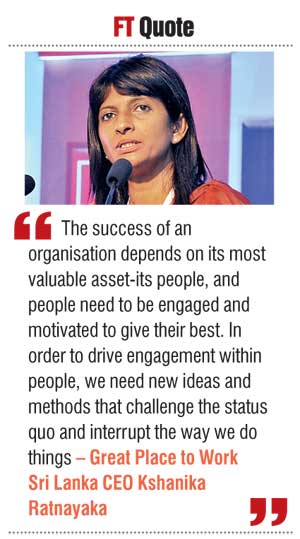 2004 is to organise the world’s information and make it universally accessible and useful. All the products made by Google revolve around this aim. Transparency is upheld at the company by holding a TGIF every Friday consecutively for 18 years by the founders which is live streamed across the world for all Googlers. They share the progress on multiple things like products, sales or new experiments through this platform. The topic is emailed one week in advance so that googlers are aware of the topic being discussed. Any questions or inquiries in relation to these discussions can be directed through the Google moderator called ‘Dory’. The most asked questions are answered by Larry and Sergey or other product heads when opened on Friday.
2004 is to organise the world’s information and make it universally accessible and useful. All the products made by Google revolve around this aim. Transparency is upheld at the company by holding a TGIF every Friday consecutively for 18 years by the founders which is live streamed across the world for all Googlers. They share the progress on multiple things like products, sales or new experiments through this platform. The topic is emailed one week in advance so that googlers are aware of the topic being discussed. Any questions or inquiries in relation to these discussions can be directed through the Google moderator called ‘Dory’. The most asked questions are answered by Larry and Sergey or other product heads when opened on Friday.
They also have a feature online called ‘Google Geist’ which is a massive questionnaire where 90% of employees give feedback. Regarding ‘voice’, every year a manager feedback is held two times a year.
The results of this are handed over to the managers and it is a part of their Objectives and Key Results (OKR). OKR is designed for every employee and everyone is aware of it.
The second principle of PO department is all people decisions are supported by science and data. Google is primarily an engineering company. Working with numbers comes naturally to its employees. Even the PO sector is looked at very analytically. When the company carries out Manager Feedback Survey, after conducting a lot of research, the people analytics team came up with a series of attributes that a top manager should have. Earlier, it used to require seven interviews for a person to be hired for Google, but recently this was brought down to four after discovering that the fifth and sixth interviews did not add much value to the hiring process.
In other companies promotion is a manager’s discretion. In Google it is not so. If a manager needs to promote some employee in his team that he feels deserves to be promoted, he should record notes on what he has done exceptionally well in his level which makes him ready for the next level. After that the manager should have a discussion, and make a presentation in front of the promotional committee and prove that he deserves to be promoted.
The next key factor in the PO department is hiring. It is an important aspect at Google.
“During my time at Google I have interviewed close to 500 people,” Bawantule said. “In Google it is carried out even if there isn’t a vacant position because we believe that we should always have a pipeline as there are so many suitable candidates out there,” he elaborated.
An interview board usually consists of four representatives, where three are from the same department or related to the sector that the new employee is hired.
The fourth, however, will be from a completely different sector as it should be cross functional. He brings the neutrality for the hiring process.
When hiring a new employee Google looks for general cognitive ability, role-related knowledge, leadership and googliness. Leadership is important because at Google it is believed it is important for an individual contributor role, as everybody works as a team at Google. Googliness refers to an employee’s humbleness and his passions, how well another googler can interact with him outside of work.
The fourth principle is manager attributes which are namely, good coach, empowers team and does not micro manage, Expresses interest/concern for team members’ success and personal wellbeing, productive and result oriented, good communicator, helps with career development, has a clear vision/ strategy for the team, has important technical skills that help him/her advice the team.
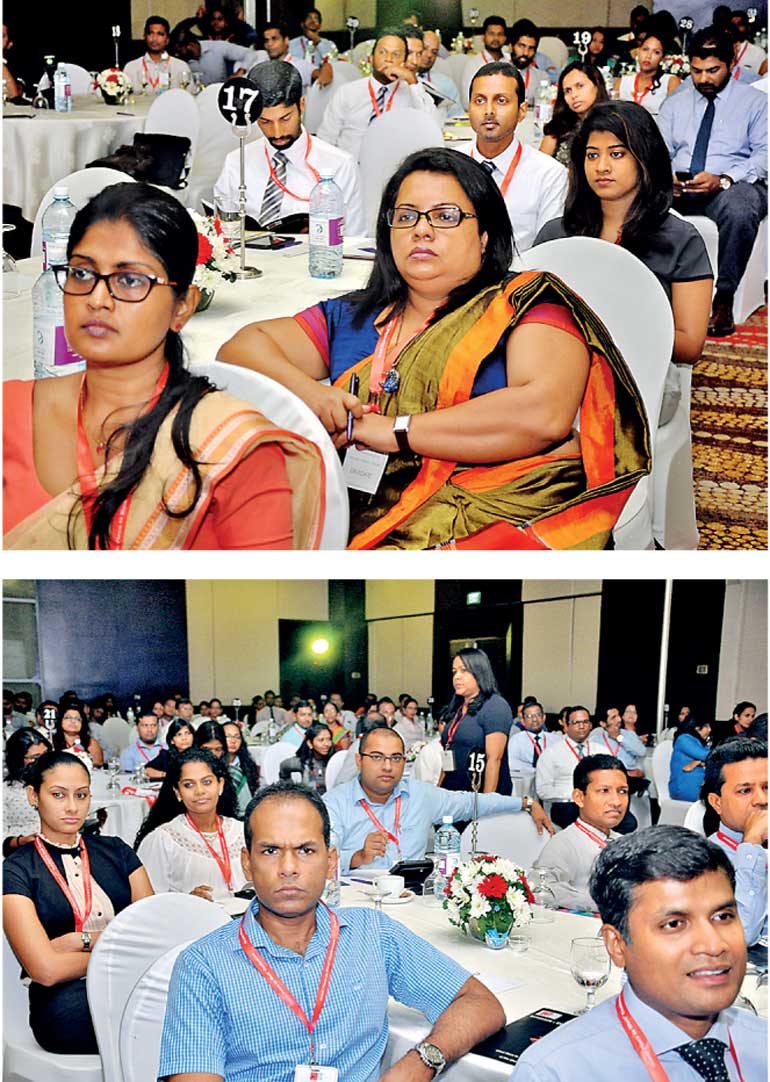
Next the conference was addressed by Harvard Business Publishing Senior Engagement Manager Sumit Harjani who shared how Netflix became one of the most successful companies worldwide through a different approach.
Harvard researches a lot on organisations that function differently and it was then that they came across Netflix who went back in terms of technology to a drawing board, asked some fundamental questions around HR and released 127 slides to the outside world 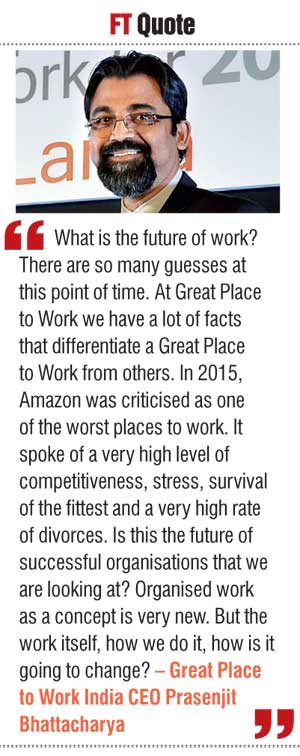 called the ‘Netflix Cultured Deck’ on which multiple business articles and case studies have been written on. It had no music, no animation and the initial perception about it was that its makers are crazy. This particular deck was viewed 11 million times and was recommended by the Facebook CEO as one of the most important documents to ever come out of Silicon Valley.
called the ‘Netflix Cultured Deck’ on which multiple business articles and case studies have been written on. It had no music, no animation and the initial perception about it was that its makers are crazy. This particular deck was viewed 11 million times and was recommended by the Facebook CEO as one of the most important documents to ever come out of Silicon Valley.
Netflix was started in 1997 by Reed Hastings and is now in 40 countries with one million subscribers and total revenue of $ 6.7 billion.
The deck released was derived from basic common sense. Its founder understood how a lot of HR policies in organisations are written for industrial applications focusing on reduced variation. But when it came to innovative firms it will not work be suitable. This deck now acts as a filter for people to get hired in Netflix.
The seven aspects of Netflix culture is namely Values and what we value, high performance, freedom and responsibility, context not control, highly aligned loosely coupled, play top of the market and promotions and development.
At Netflix, they believe in hiring only ‘A’ players, even if the post that is vacant is of utmost need to be filled. Also they are willing to let go of people who no longer fit despite how valuable their contribution had once been to the organisation.
Some of the principles that Netflix functions on are unlimited vacation time, expense policy; act in Netflix’s best interest, eliminated formal reviews and instituted informal 360-degree reviews. It has a strict no family culture, but works as a ‘Pro-sport team culture’.
Netflix’s employees do not have bonuses but a marker-based pay. It has choice in terms of equity and no employee is held hostage.
The conference was also addressed by the Great Place to Work India CEO Prasenjit Bhattacharya. “What is the future of work? There are so many guesses at this point of time. At Great Place to Work we have a lot of facts that differentiate a Great Place to Work from others,” said Bhattacharya, opening his session.
In 2015, Amazon was criticised as one of the worst places to work. It spoke of a very high level of competitiveness, stress, survival of the fittest and a very high rate of divorces. Is this the future of successful organisations that we are looking at? Organised work as a concept is very new. But the work itself, how we do it, how is it going to change?
In contrary to Netflix’s principle of adequate performance, there is a generous severance package. But, Bhattacharya also affirmed how a good performer is equally important to a top performer. After doing some research of the HR head at Netflix, he realised how that employee received a severance package owing to adequate performance. However, he feels that it is a great organisation to be from, but not a great place to work, which is supported by his past experience of working at Netflix.
“What is the future of the big fat organisation? What is technology doing, how is people analytics going to play a role?” Bhattacharyaquestioned.
Big corporates will continue to be important but jobs in future will not only be created by these big fat organisations. The reason is 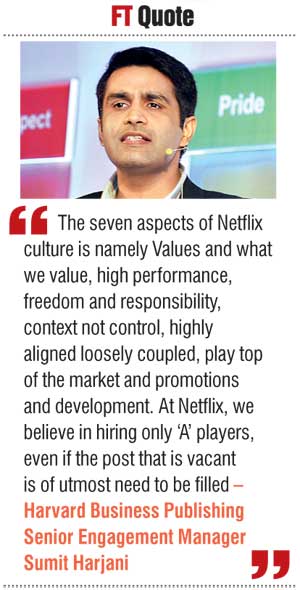 the percentage of jobs getting created for every one million increase in work force is reducing. Secondly, people do not want to work in big fat organisations anymore; 75% of professionals who used to want to work in big fat organisations has now reduced to 44%.
the percentage of jobs getting created for every one million increase in work force is reducing. Secondly, people do not want to work in big fat organisations anymore; 75% of professionals who used to want to work in big fat organisations has now reduced to 44%.
GDP has really grown in the last few years, but technology has also kept pace with that. Profit as a percentage of GDP has continued to go up in industries, however the staff cost as a percentage of GDP has continued to fall in developed economies. It means organisations have figured out to make far more money using less staff cost and a lesser number of people (through improved means of technology).
There was a widespread notion that developed economies would benefit from cost arbitrage, and jobs would be created in an unlimited manner. For the last nine years, the compensation at which entry level engineers join companies has remained the same. The real compensation has gone down in the last few years. This is slightly worrisome.
Yet, Bhattacharya explained how development in technology, use of robot manufacturers, and fewer jobs for the trained work force result in the fall of the middle-income society and therefore, reduced purchasing power. “What is automation, technology, if there is no customer base to purchase these products?” Bhattacharya questioned.
Presently 80% of the richest population in the world has wealth equivalent to the 50% of bottom population in the entire world. Top five Sri Lankans as a percentage of GDP have more than the bottom 50% of the bottom population.
Organisations usually compete in two markets. One is for customers and the other for talent. What they tend to forget is that an employee must be treated equal to a customer. The equal manner in which both a regular customer and a rare customer is treated should be applied to both a top-level employee and an average employee. Only then can an organisation reap maximum benefits in the long run.
Pix by Lasantha Kumara
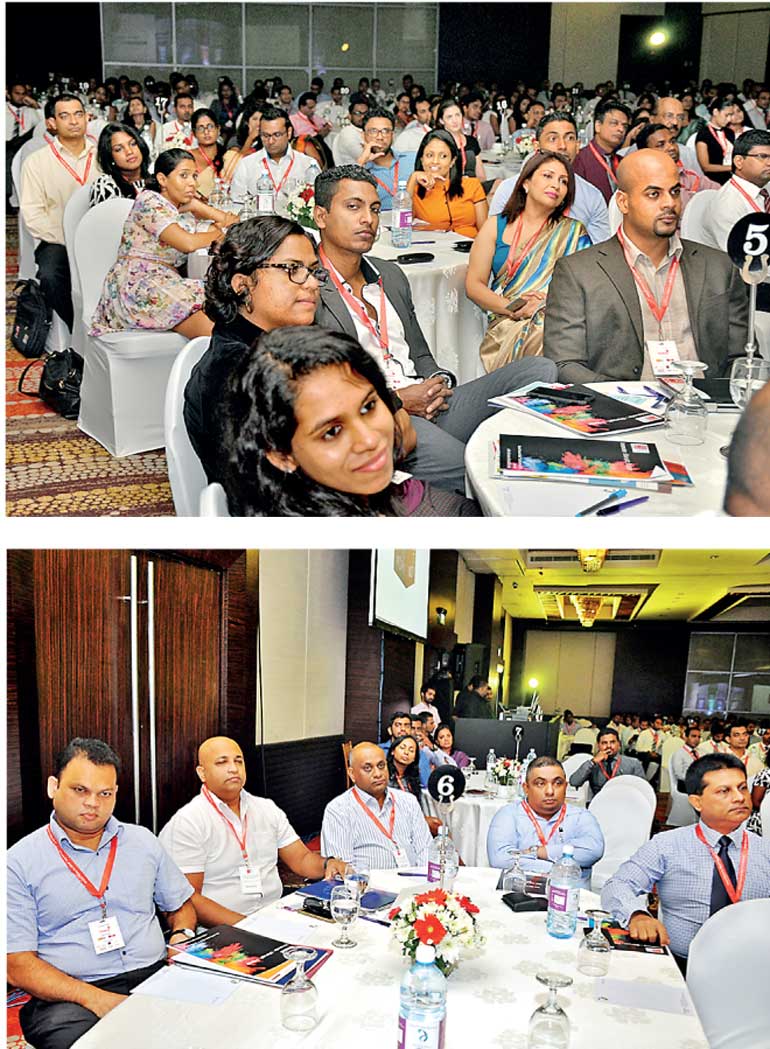
A panel discussion was also held under the conference’s title ‘Innovate:Disrupt:Engage’ featuring reputed corporate professionals of Sri Lanka – Dialog Chief Executive Officer Jeremy Huxtable, Mountain Hawk Express Chief Operating Officer and General Manager Chamila Bandara, Virtusa Polaris Senior Director of Human Resources Chandi Dharmarathne and Union Assurance CEO Dirk Perera. Great Place to Work India CEO Prasenjith Bhattacharya moderated the discussion. Following are excerpts:
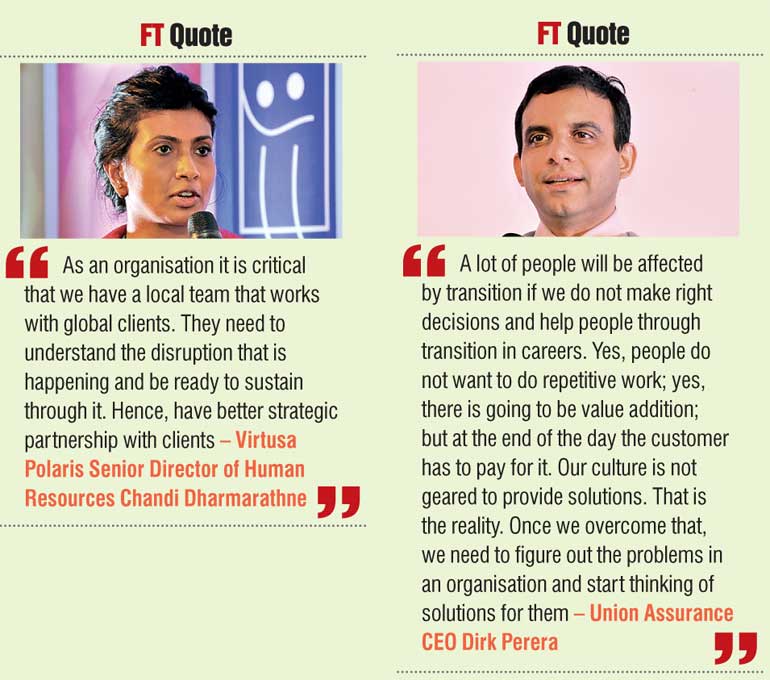
Perera: Up to 1988 insurance was a State-dominated industry. In 1988 the Government opened it up for the private sector and in 2003, the largest insurance company of the country was privatised. Following this, the industry has faced many changes. Insurance, at the moment, enjoys a lot of investments, the banking sector has seen a lot of investments going into financial technology. Health insurance in USA has faced with a lot of disruptions. In developed countries and many European countries motor insurance can be bought on a usage basis, get discounts on how well the vehicle is driven, etc. Demand for life insurance has increased within the past few years with increased focus on wellness and new devices, which can detect how healthy or unhealthy an individual is. So far prices have not been moderated by such disruptions. Its effects are quite slow on the industry. The industry is in the process of slow transmission. However, when to bring in new products or change is still not clear.
Huxtable: When I first had the privilege to come to Sri Lanka in 1995, it was difficult to get a phone. Phones and phone calls were both expensive. Customers were required to pay even for incoming calls. It was then that Dialog introduced the pre-paid package to Sri Lanka: second in Asia and the fourth in the world. Then within years we went from 20,000 subscribers to 120,000. We also imported handsets, and this was one thing that fundamentally changed the game globally. It was the first disruption in the telecommunication industry. A call was around Rs. 79 rupees at the time. But soon the prices fell and Dialog went from 1,000 connections a month to 25,000. This was a huge disruption, as we had to restructure our business strategies. In future, there will be free voice calls; free SMS and the telecom industry will have to be reinvented again. The traditional revenue form will be questioned through this.
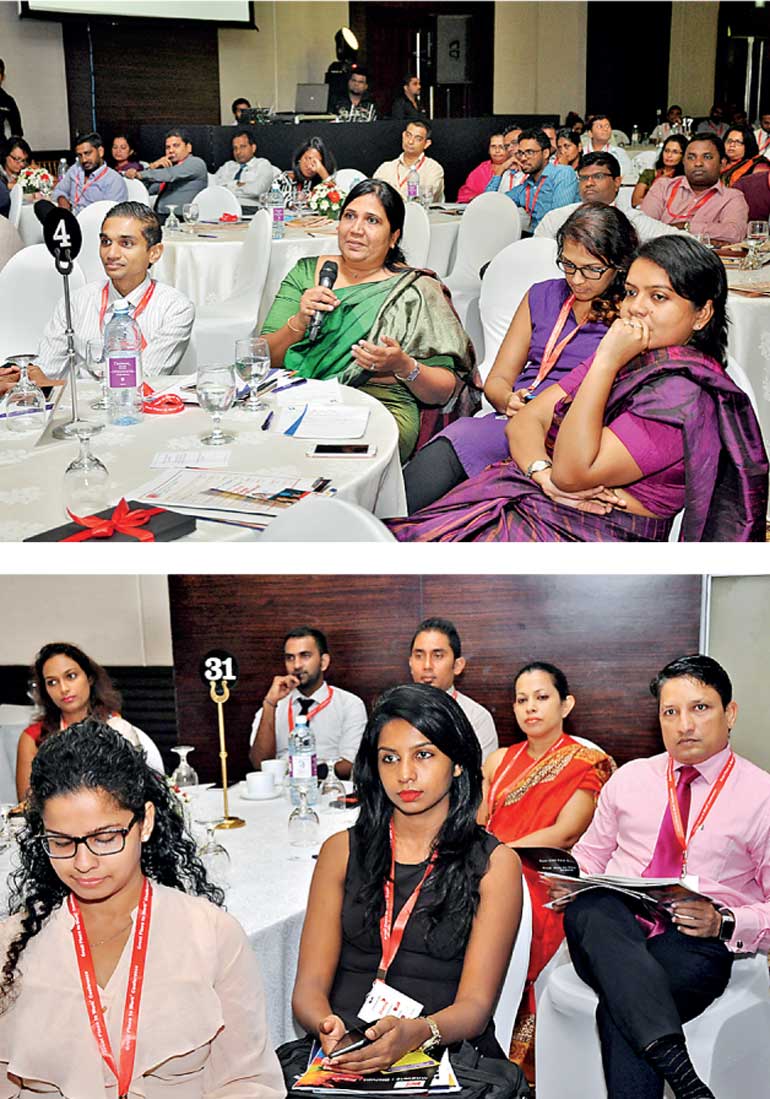
Every time we reinvent a business, a huge cost is incurred. Now we are in a market where you need to have data and connectivity but that means we have to again reinvent the business. From our point of view, this next disruption will be the hardest of all to handle. The revenue strength will be challenged, especially in Sri Lanka where both call charges and data charges are some of the cheapest in the world. To recover the Return on Investment (ROI) will require some time. Dialog is in a fortunate position as the market leader, besides its strength to deliver change. The challenge for all of us in the telecom industry is, as the disruptions become more frequent, how can we convince our shareholders to continue to invest in us and how can we make enough money to justify their investments? A disruption level in the playing field creates a disadvantage for the market leader that is already established.
Chamila: Way back in 1973 our Chairman made disruptive innovation for traditional parcel delivery, which used to depend on the postal services. He started off with the hub and spoke method that delivers parcels from one location to a hub and uses express transportation. This was a disruption for air express. Nowadays, in the industry of logistics and transport, we see a lot of disruptions along with technological advancements. It is mainly coming from e-commerce. It is not negative. It is how the traditional businesses could respond to the challenges of it.
E-commerce businesses start-up cost is lower compared to traditional capital-intensive business. The demand for service and delivery is also higher where the delivery costs are coming day by day. E-tailing is taking over the total value. For a third party to get involved in transportation is becoming challenging. Amazon is now working towards coming up with drone technology. It’ll be there in about three to four years’ time. Using drones they will be able to deliver a parcel within 20 minutes. These are the challenges that express transportation companies like FedEx face. We should not fear disruption. There are two options: either to fail in the face of it or respond to it well. As companies we need to be geared to handle disruptive logistics.
Dharmarathne: Virtusa-Polaris is a 25,000-employee organisation now. In the IT sector key is the solutions we provide to a customer, which has increasingly become to a millennial. By 2025, 75% of the workforce is going to be millennials and also the larger market is going to consist of them. Expectations of these millennials are quite high. They are digital natives so they want ease in everything – with a click of a button and faster. The manufacturing industry has been good in manufacturing through cost cutting, offshoring, and use of technology like robotic possessive automation in order to increase efficiencies and to mimic human behaviour. This is the phase that we are in now in the IT industry.
Dharmarathne: At Virtusa we have 86% millennial employees so we have a platform called ‘We Innovate’ where if an employee has an idea, it is posted and viewed by all employees and feedback is given. To learn about it there is another platform called ‘WeTube’ which is like YouTube with learning tutorials. We believe that to create such an ecosystem where it is quite transparent and accessible to anybody within the organisation using the economies of scale to make it a reality is quite beneficial.
Huxtable: You need to have open communication within an organisation, which allows ideas to happen, and a culture which accepts that not all those ideas are going to be mind-blowing and successful. You have to try and do a lot of things and accept the things that do not work. If you are encouraging people to give ideas, you must not criticise them; it must be a culture that accepts failure. Maybe not now, but in a few more years. Most innovations are time-dependent.
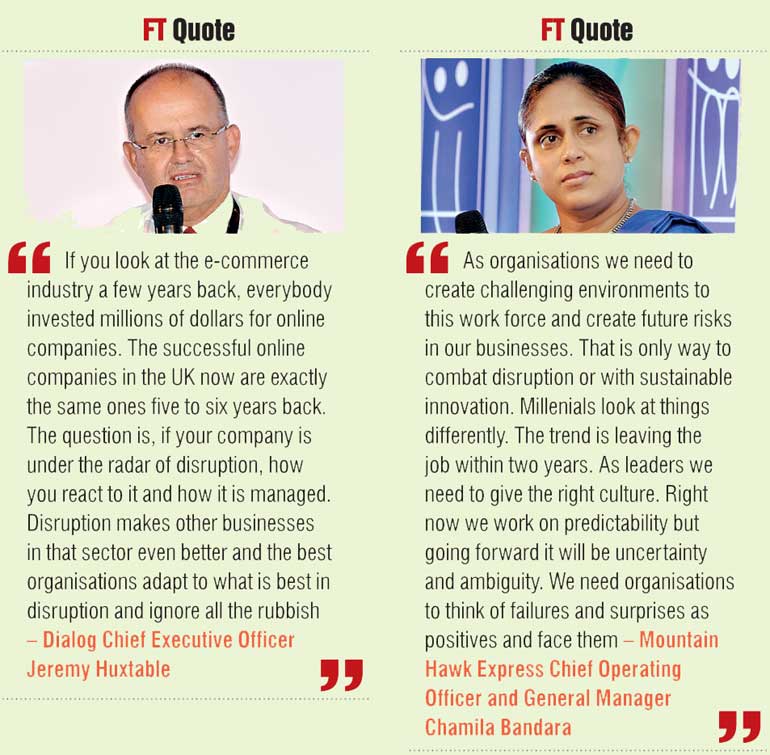
Dharmarathne: Positively, as the younger generation does not want to do repetitive work. They want value in what they do. They prefer a robot doing repetitive work and for them to be leveraged in doing value-added work. So as an employee they will be much more engaged with the organisation and as an organisation we will enjoy better ROI and hence, a win-win situation.
To conclude the panel discussion each panellist spoke in general on ‘Innovate:Disrupt:Engage’.
Perera: Capital disruption is rather strong. All the assets in the world should technically be supported with insurance and insurers with balance sheets should be able to pay if something happens to them. Globally a lot of bankers stimulate the economic value using interest rates. Therefore, traditional insurers are seeing that their insurance portfolios returns are diminishing. This is not happened in Sri Lanka at the moment. There are a lot more alternative sort of balance sheets coming into the market that take the demand away from traditional insurance. In the short term if disruption is not managed, it will not have an impact on people.
Three years ago insurance was at the bottom of a graduate’s ‘want to work for’ list. It started to actively promote it among undergraduates. Scale is essential and scale at better margins is essential to continue business. A lot of people will be affected by transition if we do not make right decisions and help people through transition in careers. Yes, people do not want to do repetitive work; yes, there is going to be value addition; but at the end of the day the customer has to pay for it. Our culture is not geared to provide solutions. That is the reality. Once we overcome that, we need to figure out the problems in an organisation and start thinking of solutions for them.
Huxtable: In the last 20 years Dialog has been majorly disrupted twice in its history. The success of a business depends on how it adapts to disruption. If you look at the e-commerce industry a few years back, everybody invested millions of dollars for online companies. The successful online companies in the UK now are exactly the same ones five to six years back. The question is, if your company is under the radar of disruption, how you react to it and how it is managed. Disruption makes other businesses in that sector even better and the best organisations adapt to what is best in disruption and ignore all the rubbish.
Bandara: Mainly, we need to look at how we tackle the millennials in our organisation. By 2030, 75% of the workplace will be millenials. However, this generation might not look at disruption as disruption. It might be something they believe in. As organisations we need to create challenging environments to this work force and create future risks in our businesses. That is only way to combat disruption or with sustainable innovation. At FedEx new technologies that are sustainable have been brought up. Millenials look at things differently. The trend is leaving the job within two years. As leaders we need to give the right culture. Right now we work on predictability but going forward it will be uncertainty and ambiguity. We need organisations to think of failures and surprises as positives and face them.
Dharmarathne: As an organisation it is critical that we have a local team that works with global clients. They need to understand the disruption that is happening and be ready to sustain through it. Hence, have better strategic partnership with clients. In HR we have reduced the number of days, time and people to do a promotion cycle or even at the entry point to the organisation, the paperwork and insurance. A robot now does the mailers. The people who did that work are now doing more value-adding work.
